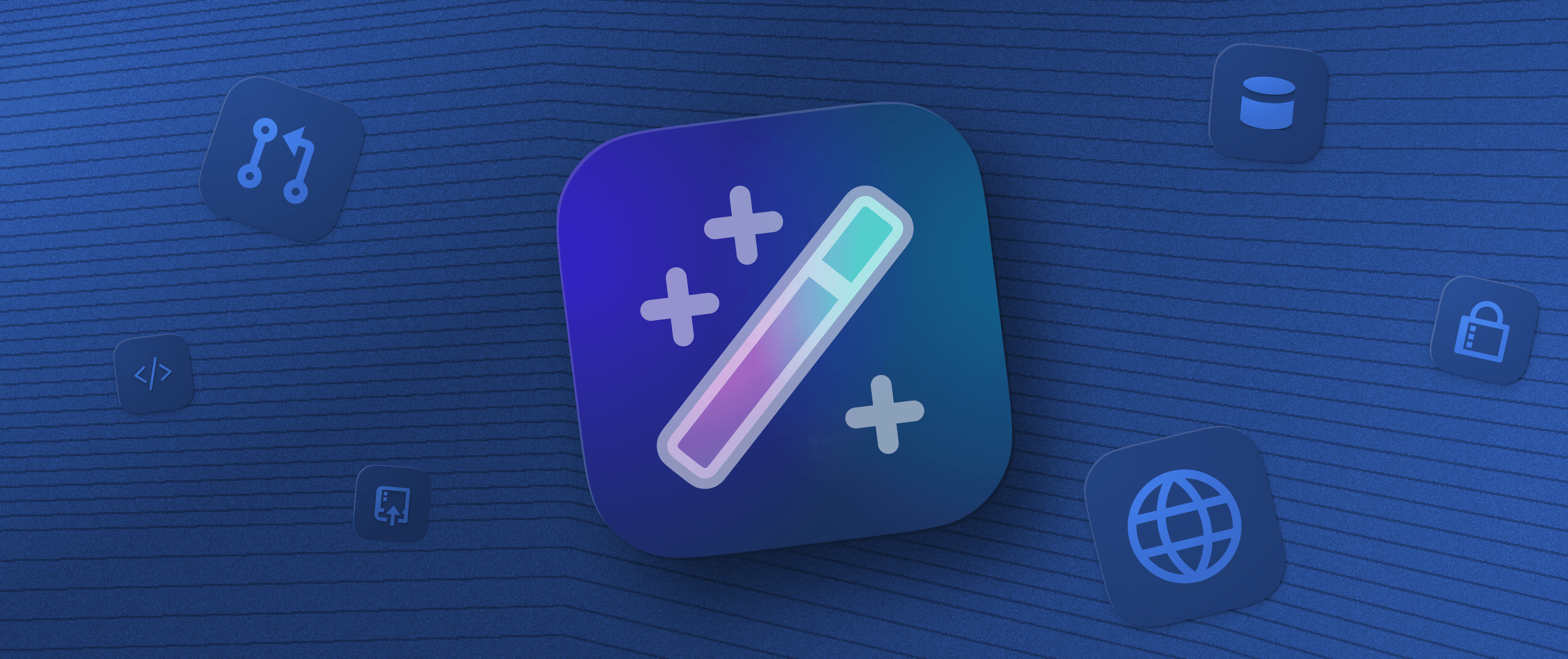AI Agents for Business: Everything You Need to Know About Appsmith Agents


Last week, we launched Appsmith Agents, our new platform that lets you configure your own custom AI agents for business. Appsmith Agents is designed to make large language models (LLMs) more useful for knowledge workers by integrating with your own private data sources inside a Chrome extension — giving you context-driven AI anywhere you do your work.
Most importantly, we’ve built our AI agents for business to be enterprise-first: They work within your security framework, not around it. (Try it out yourself today at appsmithai.com.)
The response so far has been tremendous. (This comes as little surprise, since G2 has forecast the AI agents market to grow at 44.8% CAGR over the next few years.)
Our followers are already finding unique ways to apply Appsmith Agents, and they’ve come to us with tons of thought-provoking questions as they dig into everything that’s possible when you bring AI agents to work.
We’ve rounded up some of the most frequently asked questions about Appsmith Agents below. Here, we go a layer deeper into the platform and explain what makes Appsmith Agents unique (and how you can apply it to your trickiest work headaches).
If you don’t see your question answered below, please reach out to us through Intercom within the product or email agents@appsmith.com to learn anything you want to know about this whole new way of using AI at work.
What is an AI “agent” anyway, and how is it different from a normal chatbot?
An AI agent is a form of artificial intelligence that can act autonomously within its environment.
A normal chatbot like ChatGPT or Claude works through call and response: You send it some text (or an image or video or code) and you get text (or images or videos or code) back. The AI’s work is all about producing media, and it all happens within the confines of a chat window.
Agents bring AI out of its silo, letting it loose to take actions on its own and interact with systems beyond just text and imagery. Agents can execute complex, multi-step workflows. When they’re integrated with other systems — such as Slack, Notion, Google Docs, Salesforce, Zendesk, Visual Studio Code, or another data tool — they can perform actions that humans would do using these same systems.
For example…
While a chatbot gives you text you can copy and paste into an email, an AI agent can draft and send the email for you — right from Gmail.

While you can copy and paste a Zendesk ticket into a chatbot and ask it what to do, an AI agent can interact with the ticket in Zendesk directly, pull relevant sections of your helpfile, and resolve the ticket automatically.

While you can ask a chatbot to code a feature for your product, an AI agent integrated with your existing codebase can write that feature so it fits perfectly with the rest of your code — then run it through your CI/CD pipeline.
AI agents can also proactively sense their environment — say, detecting when a person has logged into your platform for the first time — and trigger follow-on processes, such as notifying your customer support team or sending the user an email asking if they have any questions.
Both chatbots and agents draw on large language models (LLM) to function, and both are highly useful for different purposes. But AI agents have a much greater ability to streamline, automate, and support the tasks that knowledge workers do every day.
How is Appsmith Agents different from using ChatGPT or other AI agents for business?
The fundamental difference of Appsmith Agents is that it…
Integrates with all your business data sources in a meaningful way (e.g., Salesforce, Zendesk, Slack, Google Drive, Notion, PostgreSQL databases, etc.)
Deploys as a Chrome extension, so it picks up information from the webpage you’re currently visiting.
These adjustments sound simple, but the experience of using Appsmith Agents is a world away from interacting with a siloed chatbot in its own browser tab.
By integrating with all your data sources, you can use a chat interface to ask questions and take actions that are all but impossible otherwise. Without these integrations, chatbots only know what’s in their training data (or, in certain cases, what’s public knowledge on the internet).
They don’t know anything about:
Your customer details, stored in Salesforce
Your customers’ support tickets, stored in Zendesk
Your company policies, stored in Google Drive or Confluence
Your customers’ product usage, stored in an internal SQL database
Your internal discussions, stored in Slack
Any of the dozens of other tools that store your company’s private business data
But Appsmith Agents’ integrations securely pair all these company data sources with an LLM, so you can use chat to do work like:
“Summarize the issues in this customer’s last three support tickets.”
“Find our refund policy for items over $500 and check if this customer’s request meets the criteria.”
“Look up the last time this account logged into our product, and send them a personalized email if it’s been more than two weeks.”
Not only that, but the integrations let you pull data from multiple sources at once. This means the LLM can understand how your Salesforce, Zendesk, and internal data are all related. You can ask Appsmith Agents to give you a summary about a key account, then get back:
Billing information from Stripe
License details from an internal database
Support tickets filed in Zendesk
Feature requests in Github
Usage trends from Mixpanel
Anything else you need to know
Plus, Appsmith Agents lives in a Chrome extension (or integrated with tools like Slack). This gives it access to your current browser window, so your agent already knows important information that makes your life easier, like the current account you’re exploring.
Together, these upgrades make our enterprise AI agents much more fluid and useful for business teams like sales, support, customer success, human resources, and other functions.
That description barely does it justice, though. Watch our demo video below to see Appsmith Agents in action.

How does Appsmith Agents work with my company’s private data?
Appsmith Agents connects to the data sources you choose — such as SaaS tools, databases, knowledge bases, wikis, or cloud drives — and feeds that information to an LLM, so it can give more relevant answers or take actions on your private data. The Appsmith low-code application platform has already had robust system integrations for years, and our agentic AI platform builds on this foundation of stable integration.
Under the hood, Appsmith Agents uses techniques like retrieval augmented generation (RAG) and function calling to interpret fresh, trusted data from your business data sources.
Now when you ask the agent something, it can retrieve the latest facts from, say, your Salesforce instance or your policy documents, which ground its response in that information. In this way, you get accurate, context-rich answers because the AI isn’t guessing or hallucinating — it’s consulting your real data.
For example, you can ask Appsmith Agents, “What’s the status of Project X?” It then looks up notes and tickets from your various business tools.
Because our AI system is agentic, it also goes beyond just giving answers. It can take action in your business tools directly from the same window — sending emails, resolving tickets, triggering human-in-the-loop workflows, or updating database records.
Everything happens securely, and you have full control over which data sources you connect and which ones your agent can read or modify.
This is a big step up from chatbots, and it’s why organizations are excited about AI tools for business automation that leverage their own data — it makes the AI’s responses far more useful and specific to their needs.
What is “continuous context,” and why does it matter when using AI agents for business?
Continuous context is the unique innovation that Appsmith Agents uses to reduce hallucinations and make its outputs more useful for business. It establishes a layer of data integration that an LLM can draw on to generate highly specific, highly contextual responses to prompts. It involves two integrated components that provide this additional context:
Data integrations
Real-time application
Appsmith Agents integrates with standard data sources, such as SaaS tools (e.g., Salesforce, Zendesk), SQL databases (e.g., PostgreSQL, Oracle), and document databases (e.g., MongoDB). These integrations form a layer of contextual data that is unique to your organization that an LLM can use in its responses.
Both structured data (such as Google Sheets or SQL databases), and unstructured data (such as Google Docs or an internal drive of company policy documents) make up this data layer. At the same time, Appsmith Agents also receives contextual data from its real-time deployment in a Chrome extension. Here, the Chrome extension picks up data from the user’s browsing environment and passes it to the layer of contextual data as well, further enriching the user prompt with contextual information.
Together, these two fronts of contextual data contribute more relevant, up-to-date information into the integrated LLM, which enables it to generate much more accurate, relevant responses with less hallucination.
Overall, the concept of “continuous context” is similar to continuous integration/continuous deployment (CI/CD) from the world of software development.
In the 2010s, CI/CD became standard practice in the technology industry because it applied systematic, automated rigor to a critical part of the software development lifecycle, making it more repeatable and reliable. Continuous context takes a similar approach to the increasingly critical process of providing contextual data to LLMs.
How do you ensure our data stays private and secure when using Appsmith Agents?
Data privacy and security are top priorities in Appsmith Agents’ design. We recognize that companies need to trust an AI automation tool before they’ll let it near internal data. Here are several ways we address this concern:
You control your data access: Appsmith Agents connects to your data sources through secure integrations that you set up. You decide what your agents can see and do. If an agent doesn’t have permission to access a certain database or document, it simply won’t be able to use that information. In fact, every interaction enforces your existing security rules and data access permissions, just as if the user themselves were requesting the info. Thanks to discrete access controls, an agent will never surface data a given user isn’t allowed to view.
Data not used for training: By default, any queries your agent makes to external AI APIs can be configured not to be stored or used to train those models (for instance, OpenAI’s enterprise offerings allow opting out of data logging). That means your company data isn’t “feeding” a public AI. It stays within the scope of answering your question and then gets discarded.
Audit and monitoring: Appsmith Agents include monitoring features so admins can review what queries were made and what data was accessed. This transparency helps your IT and security teams audit usage and ensure nothing fishy is going on. It also ties into IT governance — the tool can integrate with single sign-on (SSO) and comply with your identity management, so that usage is tied to user accounts and existing permission sets.
What are some use cases for Appsmith Agents in my normal workday?
Appsmith Agents can handle a wide range of tasks that sales, support, customer success, and other teams deal with every day. These can range from handling routine tasks all by itself to steering human-in-the-loop workflows to speeding up human-driven processes. Here are a few examples:
Sales: Appsmith Agents can help account managers prepare for renewal calls. From Salesforce, just open Appsmith Agents in the Chrome extension and say “Give me an account summary” to get a rundown of account details, renewal dates, active users, support tickets, open feature requests, usage trends, and more. Much of this information lives outside Salesforce in other systems, but you never need to step away — it all comes right to you in the sidebar.
Technical Support: Appsmith Agents can speed up ticket resolution by recommending fixes to common problems and escalating only the complicated issues to your support staff. (Disclosure: Appsmith has actually been using Appsmith Agents for this exact purpose for weeks.) Integrate Appsmith Agents with Intercom and your help documentation, then let customers chat directly with a support bot to find the answers to their problems. If the bot isn’t helping, customers can ask a human to jump in — and your support representative can then use Appsmith Agents to surface details about product usage, previous support tickets, known bugs, and other important details you want to keep behind closed doors. The chatbot can interact with Zendesk, your internal database, and Jira, so your support team can resolve tickets or flag bug fixes right from the Chrome extension — saving tons of time.
Customer Success: Account managers can use Appsmith Agents to stay on top of customer health and engagement. For example, an agent can gather usage statistics, support tickets, and recent call notes about a client and then produce a one-page briefing for an upcoming check-in. It can even proactively alert you in Slack if a key account shows signs of churn (by cross-referencing product usage drop-off and support issues).
By having continuous context for each account, the AI can help success teams prioritize their outreach and personalize their guidance.
But the sky’s the limit when you have AI agents that understand your work right where you’re doing it. Any role that involves collecting information from multiple sources or repetitive communication can benefit from an AI copilot. Appsmith Agents takes on the heavy lifting of searching data, drafting content, and even initiating processes, so your team members can focus on higher-value work (like building relationships or strategic thinking).
Can I use Appsmith Agents inside tools like Slack, Notion, or my web browser?
Yes! A core principle of Appsmith Agents is to eliminate disruptive context-switching, so we’ve designed the platform to meet you where you already work. Now, you don’t have to jump to a separate app or website to use AI — you just embed AI agents into your existing tools.
For example, Appsmith Agents is accessible via a Chrome extension that lets you bring up your AI agents on any webpage or web app you’re using — Zendesk, Salesforce, Notion, you name it. If you’re chatting in Slack, our Slack integration allows the agent to be invoked right in your channels.
In practical terms, this means you can look at a customer record in Salesforce or other CRM and ask your AI agent a question (via the extension or integration) — and the agent will respond right there, drawing on relevant CRM data, rather than you having to copy and paste anything into an external chatbot.
By living inside your existing tools, AI agents become a seamless part of your workflow, like a smart colleague that’s always a click away. Ultimately, we believe this approach will lead to better adoption and make AI much more immediately useful for knowledge workers day-to-day.
Can Appsmith Agents perform actions or just answer questions?
They can absolutely perform actions! This is a major distinction between AI agents for business and a basic chatbot. Appsmith Agents not only chat, but also act on your behalf in connected systems when appropriate.
It’s easy to configure an agent to execute secure function calls that do things like create or update records, trigger workflows, send notifications, or even initiate human-in-the-loop approval processes — all through natural language commands or AI suggestions. You define what actions are allowed and the agent operates within those bounds. But with the right configurations, your AI agent can become a proactive helper that automates a lot of the research, data compilation, and communication you do every day.
How does Appsmith Agents reduce hallucinations without fine-tuning?
While no AI system is 100% free of errors, Appsmith Agents is specially designed to minimize hallucinations thanks to our continuous context infrastructure outlined above. Through integrating your private and proprietary data through this infrastructure, the LLM that powers Appsmith Agents has notably more contextual data about your business that it can interpret effectively. It has actual data to use in its responses, so it doesn’t need to “fill in the blanks” with its best prediction.
At the same time, Appsmith Agents provides automatic citations with links to your internal data, enabling you to easily confirm the validity and source of its responses. The result is agentic AI with dramatically fewer hallucinations that you can trust for enterprise-level applications.
How do I configure Appsmith Agents for my business?
Setting up Appsmith Agents is dead simple!
Sign up for Appsmith Agents at https://www.appsmithai.com
Log in.
Choose from one of our ready-to-go templates to configure an agent for SaaS tools, such as Salesforce and Zendesk — or create your own agent by clicking “Start from scratch.”
If you choose a template, simply sign in through the modal to connect your account through OAuth. Boom! Your agent is ready.
If you choose to start from scratch, enter the following in the fields provided:
System Instructions (e.g., “You are a support analyst. Your primary responsibility is to assist customers by resolving support requests quickly, accurately, and empathetically. You act as the first line of support and escalate only when necessary. Use plain language and always be polite.”)
Any functions you want to execute (e.g., querying databases or JavaScript functions) by clicking the Add Function.
Any data sources (by clicking the Add Sources button).
Once your agent is ready, test it out in the chat window.
If everything works to your liking, click Deploy in the top-right corner.
You can use your new agent right there in its own tab. But to add to a Chrome extension:
Right-click the Chrome extension and select “Options”.
Copy the URL of your custom agent and paste it into the URL field of the Appsmith Agents settings.
Open the Chrome extension again and presto! You’re good to start using your own context-aware AI copilot right in your browser.
Is it difficult to use Appsmith Agents? Do I need to know how to code?
Absolutely not! If you’ve ever used ChatGPT, Claude, or another LLM tool, you can use Appsmith Agents. End users in particular only need to interact with the agent through a chat interface in a Chrome extension, just like you prompt these public chatbots (or gossip with your coworkers).
You can get Appsmith Agents up and running with a template for many common SaaS tools, such as Salesforce, Zendesk, and Jira right now. But even if you want to create your own agent for a different tool or database, you simply need to add system instructions in natural language, telling the agent how to behave. For example…
“You are a support analyst responsible for helping customers resolve issues quickly, accurately, and empathetically. Classify each request (e.g., bug, billing, usage question), use the knowledge base and prior tickets to offer clear, step-by-step solutions, and tailor responses based on the customer’s plan and permissions. Escalate to a human agent if the issue involves sensitive data, security concerns, third-party systems, uncertainty, or signs of customer frustration — include a clear summary and diagnostic details when you do. Be professional, friendly, and easy to understand. Remember: You’re here to make support faster, smarter, and more helpful — without compromising trust.”
If you feel comfortable with AI model settings, you’re free to adjust your preferred re-ranking model, chunking, and temperature using the sliders and drop-downs available. But the default settings provided are designed to give good results for most users. We’ve really made it our priority to ensure that anyone — especially non-technical teams — can start using Appsmith Agents right away to improve their work.
What costs are involved with implementing and maintaining Appsmith Agents?
Appsmith Agents only costs $15/month per user for business teams to unlock a whole set of productivity improvements. Beyond our monthly subscription, the only costs are those you already pay for data sources such Salesforce, Zendesk, Google Drive, Slack, internal infrastructure hosting, or other systems.
If you’re an enterprise customer who needs custom security, hosting, or setup, please contact us to discuss options right for you.
Can I self-host my own AI agents for business on my own infrastructure?
For sure! Enterprise customers are free to self-host Appsmith Agents on their own infrastructure. Reach out to our account team to discuss the details of your implementation.
Ready to see how AI agents for business can transform your organization? Head over to https://agents.appsmith.com and sign up for Appsmith Agents today!


